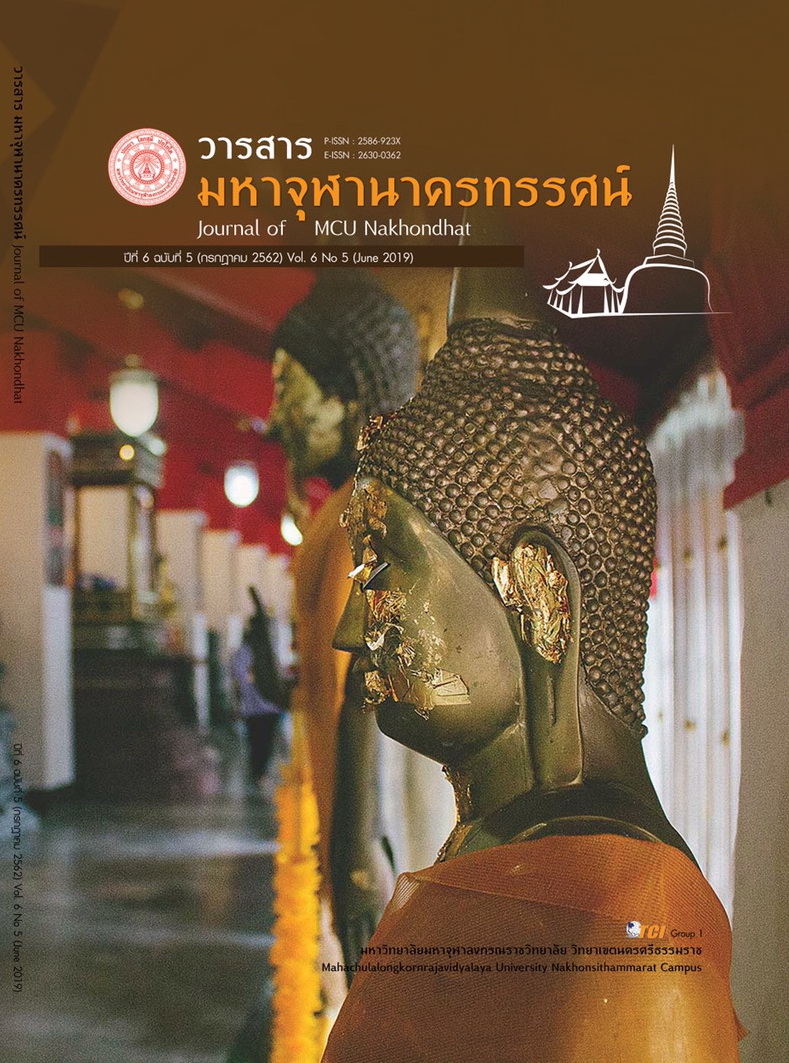THE APPLICATION OF BUDDHIST PRINCIPLES IN SUSTAINABLE SOCIAL BUSINESS
Main Article Content
Abstract
The objectives of this mixed-method research are to 1) study the administrative principles of successful social business, 2) study administrative Buddhist principles of business, and 3) propose the application of administrative Buddhist principles to sustainable social business strategic planning. The documentary research compiling Buddhist principles business and poverty as stipulated in the Tipiµaka, applicable to the successful administration of Grameen Bank and select agricultural cooperatives. The qualitative research utilizes in-depth interview and group discussion. The results showed that successful social business hinges heavily on the vision and mission aimed at solving poverty. The issuance of loans must adhere to three processes: A) all parties involve must develop mutual confidence in each other and in themselves, B) monitoring is achieve through group dynamics, and C) non-negotiable financial discipline and compulsory savings, the Buddhist principles that reflect modern entrepreneurship are the following: the Tuthiyapaphanikha sutta (qualities of a successful businessman) Diññhadhammikattha-sa§vattanika-dhamma (virtues leading to temporal welfare) and the Bhogavibhāga (fourfold financial division). Regarding the solution to poverty, Dàna (the principle of charity), and Saddhà (confidence) should be applied together with the principles of Attha 3 (virtues leading to temporal welfare) and the principles of good friend and Iddhipada 4 (path of accomplishment). The author proposes that, first, to achieve sustainable social business, the organization should apply the Attha 3 to guide its visions, missions, and organizational culture. Second, the Diññhadhammikattha (temporal welfare), with the support of Saddhà, could be used to inculcate morality and work ethics in members. Third, Iddhipada 4 should be applied to corporate internal procedure to further enhance innovation. Last, remunerative must be ethically and economically viable.
Article Details
References
M.Nurul Alam and Dr.Mike Getubig. (2561). Guidelines for establishing and operating Grameen-style Microcredit programs. เรียกใช้เมื่อ 31 สิงหาคม 2561 จาก https://static1.squarespace.com/static/5aaac2c1d274cb7149773430/t/5b8fef9f03ce64569ac896f4/1536159656034/Grameen+Replication+Guidelines.pdf
Yunus Muhammad. (1997). Banker of the Poor: Micro-Lending and the Battle Againt World Poverty. New York: Public Affairs.
Yunus Muhammad. (2007). Creating a World without Poverty,Social Business and the future of Capitalism. New York: Public Affairs.
กรมส่งเสริมสหกรณ์. (2551). อุดมการณ์ หลักการ วิธีการสหกรณ์ (ชุดฝึกอบรม). กรุงเทพมหานคร: สำนักพัฒนาและถ่ายทอดเทคโนโลยีการสหกรณ์.
กรมส่งเสริมสหกรณ์. (2560). ทำเนียบสหกรณ์ดีเด่นแห่งชาติปี 2517-ปัจจุบัน. เรียกใช้เมื่อ 20 เมษายน 2562 จาก https://www.cpd.go.th/cpdth2560/index.php/information-cpd/person-coop
นายสนอง เกี้ยวกลาง,ที่ปรึกษา และอดีตผู้จัดการ, สหกรณ์การเกษตร ขามสะแกแสง จำกัด. (20 กันยายน 2561). การประยุกต์หลักพุทธธรรมในการบริหารธุรกิจเพื่อสังคมที่ยั่งยืน. (นางสาวศศมน ศุพุทธมงคล, ผู้สัมภาษณ์)
นายวัฒนา โอภานนท์อมตะ,ที่ปรึกษาอาวุโส บริษัท บางจาก คอร์ปอเรชั่น จำกัด (มหาชน). (15 มกราคม 2562). การประยุกต์หลักพุทธธรรมในการบริหารธุรกิจเพื่อสังคมที่ยั่งยืน. (นางสาวศศมน ศุพุทธมงคล, ผู้สัมภาษณ์)
นางปาณชญา บวชสันเทียะ. (21 กันยายน 2561). การประยุกต์หลักพุทธธรรมในการบริหารธุรกิจเพื่อสังคมที่ยั่งยืน. (นางสาวศศมน ศุพุทธมงคล, ผู้สัมภาษณ์)
นายกฤษณะ บุญยะชัย. (17 ธันวาคม 2561). การประยุกต์หลักพุทธธรรมในการบริหารธุรกิจเพื่อสังคมที่ยั่งยืน. (นางสาวศศมน ศุพุทธมงคล, ผู้สัมภาษณ์)
นายรังสรรค์ ตีณรงค์, ผู้จัดการใหญ่, สหกรณ์การเกษตรเมืองลับแล จำกัด (13 ธันวาคม 2561). การประยุกต์หลักพุทธธรรมในการบริหารธุรกิจเพื่อสังคมที่ยั่งยืน. (นางสาวศศมน ศุพุทธมงคล, ผู้สัมภาษณ์)
พระพรหมคุณาภรณ์ (ป.อ.ปยุตฺโต). (2552). พุทธธรรม ฉบับปรับปรุงและขยายความ พิมพ์ครั้งที่ 11. กรุงเทพมหานคร: มหาวิทยาลัยมหาจุฬาลงกรณราชวิทยาลัย.
พระมหาหรรษา ธมฺมหาโส. (9 ธันวาคม 2561). การประยุกต์หลักพุทธธรรมในการบริหารธุรกิจเพื่อสังคมที่ยั่งยืน. (นางสาวศศมน ศุพุทธมงคล, ผู้สัมภาษณ์)
มหาจุฬาลงกรณราชวิทยาลัย. (2539). พระไตรปิฎกฉบับภาษาไทย ฉบับมหาจุฬาลงกรณราชวิทยาลัย. กรุงเทพมหานคร: โรงพิมพ์มหาจุฬาลงกรณราชวิทยาลัย.
สฤณี อาชนานันทกุล. (22 มิถุนายน 2561). Triple Bottom Line. เข้าถึงได้จาก http://www.salforest.com/glossary/triple-bottom-line.
สหกรณ์การเกษตรเมืองลับแล จำกัด. (2561). รายงานกิจการประจำปี ในรอบปีบัญชี 1 เมษายน 2560 - 31 มีนาคม 2561.
นางอมรกัญ ปรากฏผล, หัวหน้าฝ่ายสินเชื่อ, สหกรณ์การเกษตรสบปราบ จำกัด, . (12 ธันวาคม 2561). การประยุกต์หลักพุทธธรรมในการบริหารธุรกิจเพื่อสังคมที่ยั่งยืน. (นางสาวศศมน ศุพุทธมงคล, ผู้สัมภาษณ์)


